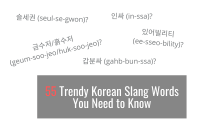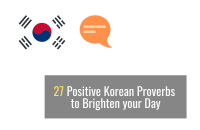Here are the most frequently used expressions in Korean.
I use Kakao emoticons to illustrate the emotions behind these expressions.
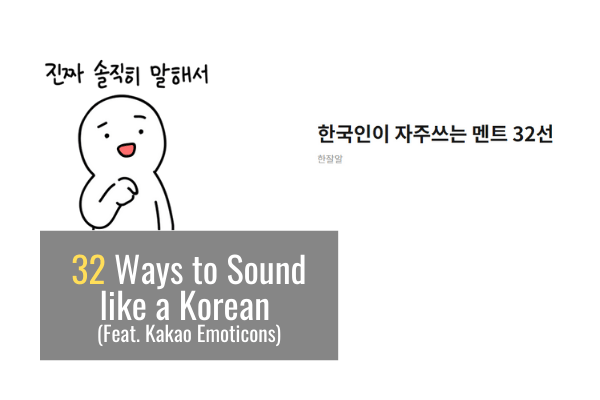
Introduction
Life can be tough for Koreans and expressions are ways to cope with stress.
Not all Koreans are stressed out, but many are.
The culture is changing slowly and working hours are decreasing.
Work life balance or 워라밸 is becoming a trend finally.
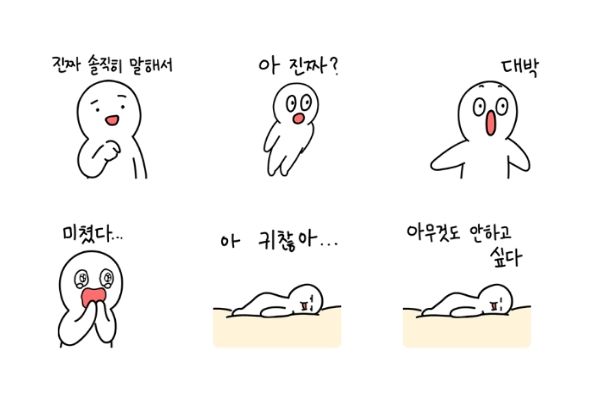
To be perfectly honest – 진짜 솔직히 말해서 (jin-jja sol-jik-hee mal-hae-seo)
It literally means “really honestly speaking”.
Koreans often use this phrase before complaining, pointing something out or comparing something.
English equivalents would be “real talk”, “for reals” or “to be frank”.
Oh, really? – 아 진짜? (ah jin-jja?)
It’s more of a filler that doesn’t mean anything. Koreans use this frequently as a response.
When a friend tells you what happened or brings news, you can say “아 진짜?”.
Awesome! – 대박 (dae-bak)
It literally means “jackpot”. But Koreans use it to mean “awesome” or “cool”.
We also frequently add “아 (ah)” to say “아 대박” or “아 대박이다” as a full sentence.
That’s crazy – 미쳤다… (mi-chyeot-da)
It can mean someone or something is either crazy, shocking or awesome depending on the context.
This expression doesn’t necessarily mean anything negative. Koreans use this when they’re surprised or even touched.
I don’t feel like it – 아 귀찮아… (ah gwi-chan-ah)
Koreans use this expression when we don’t want to do anything.
It literally means “pain in the neck”, “troublesome” or “too lazy to do something”.
You can say “아 귀찮아” when you have to do something, but don’t feel like it at all.
Common Korean Words and Phrases you Need to Know
I don’t want to do anything – 아무것도 안하고 싶다 (ah-mu-geot-do ahn-ha-go sip-da)
It can be used together with the previous phrase like, “아 귀찮아… 아무것도 안하고 싶다.”
Koreans use it often because we’re told to do many things by parents, teachers, bosses, etc.
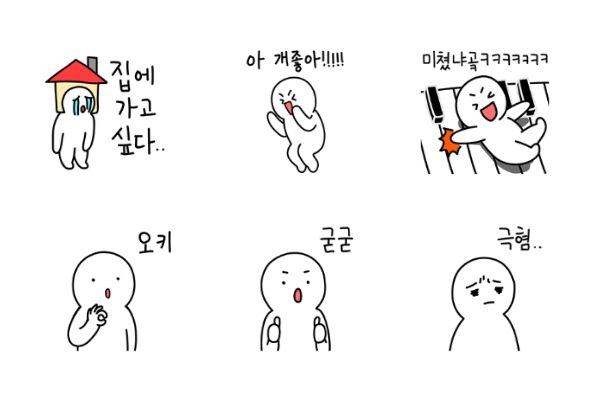
I want to go home – 집에 가고 싶다.. (jib-eh gah-go sip-da)
Koreans don’t get to spend much time at home. We’re either at work or school.
Whenever my friends are at work, they say “집에 가고 싶다”.
You can even combine the previous expression and say “집에 가서 아무것도 안하고 싶다”, meaning I want to go home and do nothing.
I love it!! – 아 개좋아!! (ah gae-jo-ah)
It’s a slang used by young Koreans. Make sure not to say this to older people in Korea.
개(gae) means dog in Korean, but it’s used to emphasize the amount of like in this case. 좋아(joa) means “like”.
That’s so crazy LOL – 미쳤냐곸ㅋㅋㅋㅋㅋ (mi-chyeon-nya-go)
“ㅋ(k)” is a laughing sound in Korean. It’s used together like “ㅋㅋㅋㅋ” between friends.
We also use “ㅎ(h)” for laughing, but ㅎ is used between acquaintances or someone not too close.
In this case, “crazy” doesn’t mean anything negative. It just means “that’s so crazy” or “that’s crazy funny”.
Okay – 오키 (oki)
Koreans also use ㅇㅋ as an abbreviation. ㅇㅇ (응, yes) is widely used as well.
On the other hand, no is ㄴㄴ(아니, no).
Good good – 굳굳 (gut-gut)
It has the same meaning as it does in English. Good, with a thumbs up.
Gross! Hate it! – 극혐.. (geuk-hyeom)
극혐 is short for 극도로 혐오스럽다 or 극한의 혐오, meaning extremely disgusting or an intense hatred.
Koreans use this expression when we hate something. You can say “something 극혐” or “something is 극혐이다.”
It doesn’t have any positive meaning, so please use it wisely.
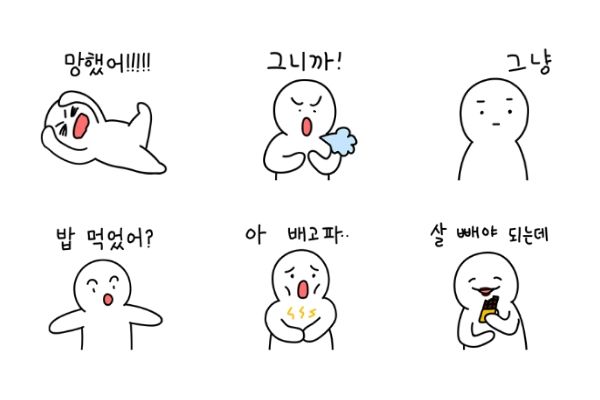
I’m doomed! I’m screwed! – 망했어!!!!! (mahng-haet-seo)
It’s a casual way of saying something is messed up or I’m screwed.
Koreans usually say this when we get bad grades in school or when we mess something up at work.
That’s what I’m saying! Totally! – 그니까! (geu-ni-kka)
Koreans use this to agree with someone. It can be “그러니까 (geureonikka)” as well.
It’s commonly used with “완전 (wanjeon)”, meaning totally.
Just cause – 그냥 (geu-nyang)
When someone asks why you did something and when you have no reason, you can simply say “그냥”. No reason. Just cause.
English teachers in Korea often hear this expression and it’s known to frustrate them.

Did you eat? – 밥 먹었어? (bap meo-geo-sseo?)
Koreans are kind of obsessed with 밥 (bap, meaning steamed rice or meal), so we mention it in almost every conversation.
It literally means “did you eat?”, but it can actually mean either “did you eat?”, “what did you eat?” or “how are you?”. The proper response is simply 네(yes).
I’m hungry – 아 배고파.. (ah bae-go-pa)
Despite the fact that most Koreans are considered slim by western standards, they eat a lot. We even created 먹방 (Mukbang), or people eating online.
Whenever we feel even a bit hungry, we say “아 배고파”. You can expect to hear this often in Korea.
I need to lose weight though – 살 빼야 되는데 (sal ppae-ya doe-neun-deh)
Koreans eat a lot, but also care about weight control all the time.
We still eat anyhow, but never fail to mention “살 빼야 되는데” before or after eating.
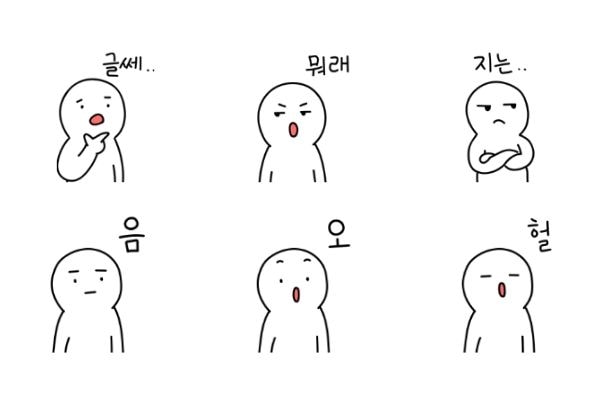
Well… – 글쎄.. (geul-sse)
It means “well…” or “hmm…” before starting a sentence.
Also, when Koreans can’t decide something like what to eat, we say this.
What? What are you talking about? – 뭐래 (mwo-rae)
It means “what did you say?” or “what is he/she saying?” in a not-so-polite way.
When you hear something disturbing or annoying like “살 좀 빼(sal jom bbae, meaning lose some weight)”, your response can be “뭐래”.
What about you? Look who’s talking – 지는.. (ji-neun)
This is similar to the previous expression, but focuses more on “you”.
Koreans use these together like, “뭐래… 지는…” to mean “what…? what about you?” in an annoyed way. For example, if someone calls you fat, you can respond with that combo. These should be used just between friends.
Hmm – 음 (eum)
Koreans use this when we don’t have anything to say or when we’re thinking of what to say. Just like “hmm”.
Wow – 오 (oh)
Koreans say “oh”, but it’s closer to a mild “wow”.
OMG – 헐 (heol)
In every annoying, disturbing or surprising situation, Koreans will say “헐”.
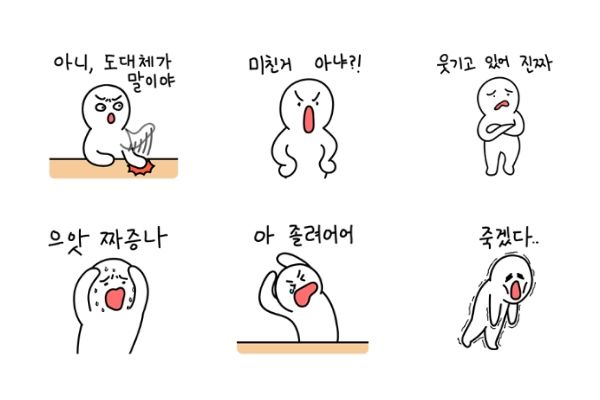
What the hell is this? – 아니, 도대체가 말이야 (ani, do-dae-che-ga mah-ri-ya)
Koreans use this expression when they’re mad at someone.
Usually, a superior who is mad at his/her team member will say this.
When you hear this from your Korean boss, you can expect a scolding to follow.
Isn’t that crazy?! Isn’t he/she crazy? – 미친거 아냐?! (mi-chin-geo ah-nya?!)
Koreans say this when we’re upset with someone.
When someone’s boyfriend/girlfriend is cheating on them or someone did something terrible to your friend, you can say “미친거 아냐?”.
That’s totally absurd – 웃기고 있어 진짜 (ut-gi-go isseo jin-jja)
It literally means “really funny”, but it’s never used in a good way.
It actually means “someone or something is being totally absurd” and is used when you disagree.
Ugh, annoying! – 으앗 짜증나 (euat jja-jeung-na)
Koreans use this frequently since life can be tough there.
It can mean something or someone is slightly annoying or seriously annoying, depending on the tone.
I’m sleepy – 아 졸려어어 (ah jol-lyeo)
You can use it with your friends when you’re sleepy during the day or at night.
I’m exhausted – 죽겠다.. (juk-get-dah)
It sounds like someone’s dying, but it just means that someone’s really tired.
Koreans use it when they’re extremely tired after staying up all night, drinking too much, studying a lot or working too much.
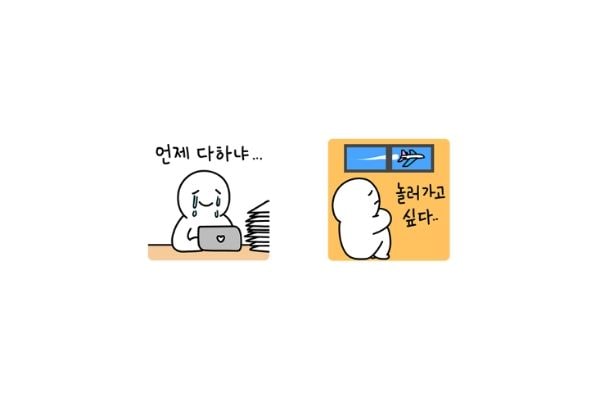
When will I be done? – 언제 다하냐… (eon-je da-ha-nya)
Koreans always have things to do, whether it’s work or study.
You can use “언제 다하냐” when you have a lot of homework or tasks at work.
I want to go out. I want to travel – 놀러가고 싶다.. (nol-leo-ga-go sip-da)
As you might have guessed, Koreans love traveling.
Whenever we want to go somewhere, we say “놀러가고 싶다” in a bit of a sad way, because we are too busy to travel usually.
The Korean language evolves at a lightning pace. Staying current can make life a lot more fun as an expat or a Korean language learner.
Did we miss anything?
Even though Koreans work and study a lot, they find fun ways to express emotions.
When I lived in Korea, I would often use these emoticons to gain comfort, since I was in the same boat as my friends.
Let us know your favorite expression in the comments!
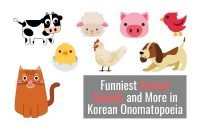

![137 Konglish Words You Shouldn’t Live Without [with Examples]](https://linguasia.com/wp-content/uploads/137-Konglish-Words-You-Shouldnt-Live-Without-200x130.png)
